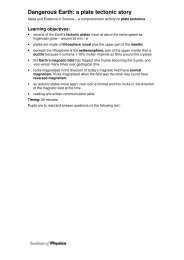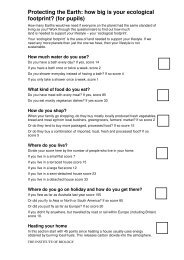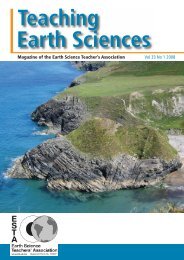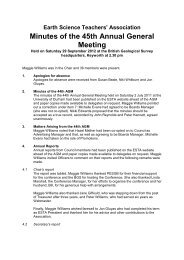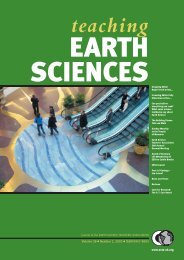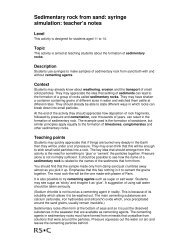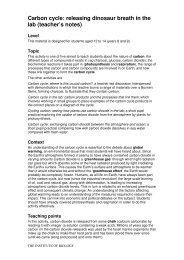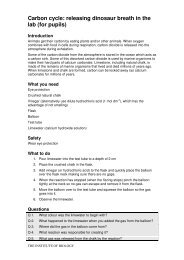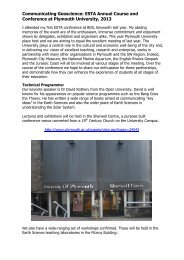teaching - Earth Science Teachers' Association
teaching - Earth Science Teachers' Association
teaching - Earth Science Teachers' Association
- No tags were found...
You also want an ePaper? Increase the reach of your titles
YUMPU automatically turns print PDFs into web optimized ePapers that Google loves.
TEACHING EARTH SCIENCES ● Volume 30 ● Number 1, 2005<br />
Massive Sea Surges Triggered by the Strongest<br />
<strong>Earth</strong>quake in the World for 40 Years<br />
CALLY OLDERSHAW<br />
This is just one of the many headlines that covered papers and magazines recently. Christmas and New Year<br />
was over-shadowed by the terrible disaster in Asia in which hundreds of thousands people lost their lives and<br />
many more were injured or made homeless. Exact numbers of people killed, injured or missing in the countries<br />
hit, are impossible to confirm. Websites are a useful resource for finding more about the science of tsunamis.<br />
Natural disasters are part of the <strong>Earth</strong> sciences, but<br />
whether you are discussing tsunamis as part of<br />
the geology syllabus, science, geography, citizenship,<br />
religious studies or any other part of the curriculum,<br />
the following websites may be helpful to give<br />
an insight into the science of these underwater earthquakes<br />
and the resulting tsunamis.<br />
Whether you planned to cover natural disasters or<br />
even tsunamis in your classroom this month, it may be<br />
just the right time to cover not only the science, but<br />
other issues such as risk and hazard, trauma, policies<br />
and strategies to cope with disasters, moral and ethical<br />
issues and global responsibilities – class projects, discussions<br />
and debates can be built around the <strong>Earth</strong> science<br />
phenomenon which is usually restricted to just a<br />
small part of the curriculum.<br />
Newspaper articles, television programmes and<br />
news items, books and personal experiences can be<br />
used to enhance the learning experience, while research<br />
using websites can give up to the moment news, views<br />
and more:<br />
The main television channels have websites with<br />
news pages and related links in the UK and worldwide:<br />
www.bbc.co.uk<br />
www.itv.com<br />
www.channel4.com<br />
www.bbc.co.uk/science/hottopics/naturaldisasters is a<br />
related site, which gives background information on various<br />
natural disasters, including tsunamis (incorrectly<br />
referred to as tidal waves). The quiz and vote are an interesting<br />
addition and can be useful to initiate classroom<br />
discussion on issues such as risk and hazard as well as<br />
one’s feelings of safety at home or on holiday etc.<br />
Natural Disasters<br />
● Keypoints<br />
● <strong>Earth</strong>quakes<br />
● Volcanoes<br />
● Tornadoes and hurricanes<br />
● Floods and storms<br />
● Tidal waves and droughts<br />
● Could natural disasters devastate Britain<br />
● Quiz: What do you know about disasters<br />
● Vote: Do you feel at risk<br />
● Timeline of events<br />
Links from this page include pages on the Horizon<br />
programme of October 2000 called ‘Mega-tsunamis’,<br />
where the question ‘Could a huge landslide in the<br />
Canaries cause a tsunami big enough to wipe out New<br />
York’ was explored. A summary, photographs and a full<br />
transcript of the programme can be viewed.<br />
For an information sheet that can be downloaded<br />
for use in classrooms at all levels, download the<br />
Tsunamis title in the <strong>Earth</strong> in Our Hands series written<br />
by Cally Oldershaw www.geolsoc.org.uk, then<br />
type EIOH in the search box. Hard copies can be<br />
requested from the Geological Society on telephone<br />
020 7434 9944. The information sheet introduces the<br />
topic in clear, easy to understand language, gives clear<br />
definitions, facts and figures and lists useful contacts<br />
and websites for further research.<br />
You may have seen Bill McGuire giving live interviews<br />
on the television and commenting on the science<br />
of tsunamis. Bill McGuire, Simon Day and others at<br />
the Benfield Hazard Research Centre (based in University<br />
College, London) research natural hazards<br />
including tsunamis. The website www.benfieldhrc.org/<br />
SiteRoot/tsunamis defines tsunamis as:<br />
● Large, potentially destructive sea waves, most of<br />
which are formed as a result of submarine earthquakes,<br />
but which may also result from the eruption<br />
or collapse of island or coastal volcanoes and the formation<br />
of giant landslides on marine margins.<br />
BHRC research focuses on:<br />
There are sections on:<br />
● Assessment of global tsunami hazard and risk<br />
● Tsunami hazard and risk in the North Atlantic Basin<br />
● Mega-tsunami formation due to the lateral collapse<br />
of ocean island volcanoes<br />
Roger Musson (British Geological Survey, Murchison<br />
House, Edinburgh) has also been called upon by the<br />
media to give his views on earthquakes and tsunamis.<br />
See www.earthquakes.bgs.ac.uk/ for information on<br />
the recent magnitude 9.0 earthquake of 26 December<br />
2004 near Northern Sumatra. There is also information<br />
about UK earthquakes, hazards and facts and figures<br />
worldwide.<br />
21 www.esta-uk.org



